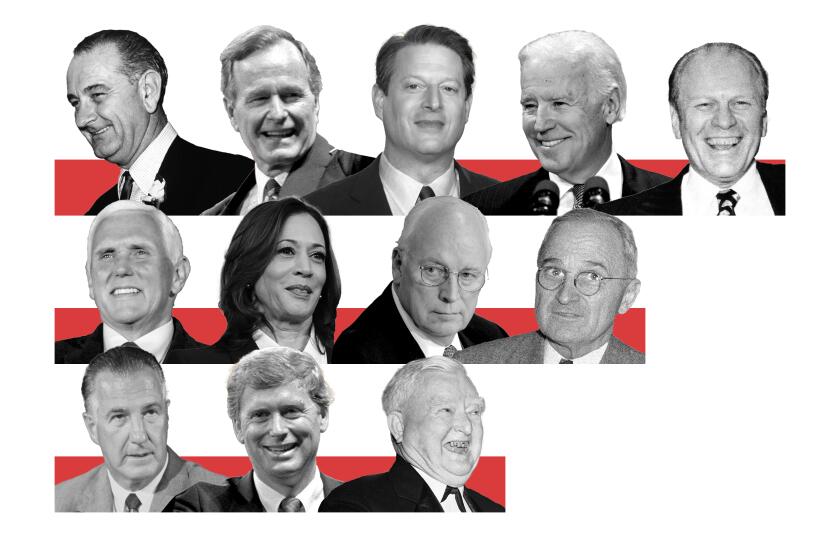House Republicans should choose a different hostage in budget fight

I feel House Speaker John Boehner’s pain.
Maybe it’s because we’re both from Ohio and we were both raised by parents who grew up during the Depression, but I am completely in sync with Boehner on the threat posed by the federal debt. And though we may not agree on how to address it, I suspect we see the outlines of the problem in much the same way.
So I understand why Boehner and his fellow House GOP leaders are saying they won’t raise the debt limit without a deal to reduce the annual federal deficits and bring the burgeoning debt under control. The improving economy has helped slow the accumulation of federal IOUs, but Washington is still borrowing money faster than the economy is growing, and the gap between revenue and outlays is expected to widen again within a decade.
The debt limit is an inviting target for hostage-taking because it affects every aspect of the federal budget. The government has to borrow not just for the sake of discretionary spending, which the annual appropriations bills control, but also for the entitlements that spend money on autopilot, such as Medicare and Social Security.
But therein lies the problem. If Congress doesn’t raise the debt ceiling, Washington won’t have enough money to pay the contractors, employees, investors and beneficiaries it has already committed (in statute) to pay. It will fall short by 15% to 17%, according to the Congressional Budget Office. That’s considerably better than in fiscal 2012, when Washington had to borrow 30% of the money needed to cover its expenses. But it’s still an enormous amount of money -- more than $1.5 billion a day.
As I’ve written numerous times before, refusing to raise the debt limit isn’t analogous to cutting up the feds’ credit card; it’s analogous to ignoring the feds’ credit card bill. With less money than needed to meet the commitments already made, the Treasury will have to decide which creditors to stiff and which ones to pay. That’s an invitation for a credit downgrade and a Wall Street meltdown.
The first rule in hostage-taking is that no threat is credible unless you’re willing to carry it out. In order to have leverage in the debt-ceiling negotiations, Boehner has to be willing to force the government to hit the borrowing wall in mid-October, when the Treasury is expected to run out of ways to function without breaching the debt limit.
Of course, the same could be said for President Obama and Senate Democrats. But who is the public more likely to blame for the consequences of the debt limit not being raised in time -- the side that took the debt limit hostage, or the side that refused to pay the ransom?
And consequences there will be. As The Times’ editorial board noted in an editorial Thursday, the last time the House GOP threatened not to raise the debt limit, in 2011, “the stock market tumbled and the economy staggered.”
Which brings me back to Boehner. He and Obama have tried several times to bring Republicans and Democrats together on a budget “grand bargain” that would settle the festering disputes over spending, entitlements and taxes. But there’s a yawning chasm between the two sides over how fast to cut the deficit and how far. The GOP approach also depends on deep reductions in projected entitlement spending, particularly Medicaid, the 2010 healthcare law and, further down the line, Medicare. Democrats, on the other hand, want to narrow the budget gap with higher taxes.
That’s why leverage is so important. Because there’s no comfortable middle ground, at least one side will have to make some painful concessions.
The question, then, is where to look for this leverage. One obvious place would be in the annual spending bills, but as noted above, they affect only discretionary spending, not entitlements. And GOP hard-liners already are consumed with the idea of using that leverage to “defund Obamacare,” not to reach a budget deal.
The debt limit is next up in the queue of big fiscal issues. Yet it’s radioactive, both politically and economically.
There’s one other pressure point that Boehner could use. Under the 2011 Budget Control Act, more than $1 trillion in projected spending will be slashed from 2013 to 2022 through across-the-board reductions in discretionary programs, half of them coming from homeland security efforts. The first round of “sequester” cuts started taking effect a few months ago, and the next is due shortly after Congress wraps up this year’s session.
The pain from this belt-tightening will increase progressively. Numerous Republicans are already squawking about the effect on the Pentagon, while Democrats complain that the austerity will only make the struggling economy weaker.
With both sides looking to end the sequesters, the question is how to replace them. Here is where the Republicans have the most power to set the terms. They can insist that any change not increase the deficit; otherwise, they’ll take no action and the cuts will go into effect as scheduled. They can then try to force the Democrats to accept deeper reductions in projected entitlement spending than the party has supported in the past. Democrats, meanwhile, will continue to bargain for a combination of entitlement curbs and tax increases.
The threat of the annual sequesters wasn’t enough to prod Congress to strike a long-term budget deal in 2011. But the reality of the sequesters could do the trick. And that pressure would remain even if Congress raised the debt ceiling with no strings attached, as Obama has demanded.
ALSO:
Ring of truth in ‘Orange Is the New Black’
Getting California’s bullet train back on track
Follow Jon Healey on Twitter @jcahealey and Google+
More to Read
A cure for the common opinion
Get thought-provoking perspectives with our weekly newsletter.
You may occasionally receive promotional content from the Los Angeles Times.











